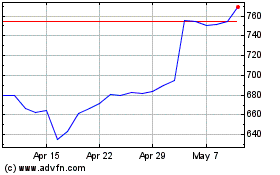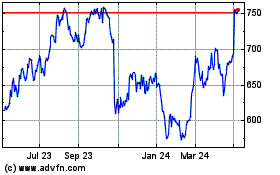By Dylan Tokar
The Justice Department in recent years has issued a series of
policies designed to incentivize companies to invest in programs
that ensure employees don't violate the law.
Few have been as central to those efforts as Andrew Weissmann,
who was chief of the department's criminal fraud section from 2015
to 2017.
Mr. Weissmann helped launch a precursor to the FCPA Corporate
Enforcement Policy, a leniency program that gives companies
discounts on financial penalties if they voluntarily disclose
potential bribery issues, cooperate with prosecutors and take steps
to prevent future violations of the U.S. Foreign Corrupt Practices
Act.
He also sought outside expertise to bolster the department's
understanding of corporate compliance, hiring a former compliance
officer for Microsoft Corp., Pfizer Inc. and Standard Chartered PLC
to advise prosecutors on assessing the compliance programs of
companies investigated by the agency. The compliance consultant
left in 2017, and the position hasn't been renewed.
"Compliance officers are really important and have a really
tough job," Mr. Weissmann says. "It's a very useful role for the
U.S. government, which is trying to reduce the incidence of
criminal behavior within companies. The goal is to try and figure
out how do you make that role as effective as possible."
Mr. Weissmann, who later served on special counsel Robert
Mueller's team investigating Russia's interference in the 2016 U.S.
presidential election, will rejoin law firm Jenner & Block LLP
in July. He spoke about the importance of corporate compliance
officers in an interview with Risk & Compliance Journal. Edited
excerpts follow.
WSJ: Since your time leading the Justice Department's fraud
section, the DOJ has continued down a path of trying to get
companies to invest in corporate compliance. Have these policies
been successful?
Mr. Weissmann: One of the goals [of the FCPA leniency policy]
was to have more consistency internally -- clear guidelines and
metrics as to how prosecutors in the fraud section doing FCPA cases
would evaluate companies on the criteria of voluntary disclosure,
cooperation and remediation. I think on that point it has been
successful.
My general sense from the defense bar is it has also been
successful in terms of knowing what to expect. In other words, "If
we do X, will we be likely to get result Y?" Companies can evaluate
the risks and rewards if they decide not to voluntarily disclose or
if they decide not to fully cooperate. They can look at the
program, and they can look at the announced resolutions to see how
other companies were treated.
WSJ: The DOJ no longer has a dedicated compliance expert and is
instead choosing to focus on training prosecutors to have that
expertise. Is that sufficient?
Mr. Weissmann: It's not that when I was there that we were
outsourcing all of the compliance issues to one person. It's that
we had a person who could run point to make sure that there was
training and there was implementation at the line-attorney
level.
We had somebody who was full time, overseeing a whole variety of
compliance issues. Thinking through compliance policy, thinking
through training, thinking through consistency in evaluating the
presentations that were made by companies. Soliciting input from
external stakeholders, including companies, in terms of what we
should or should not be doing.
My biggest concern is not whether the department has somebody
internally or externally -- there are advantages to both. One thing
I liked about having somebody who had worked in a whole variety of
companies is that it gave some comfort to companies that when they
came in and had their programs evaluated, it wasn't going to be
some DOJ lawyer who's never been in a company.
It's great to have training. But it's useful, like in many
things, to have somebody who owns a program, because then you can
make sure that there's consistency and that everyone is devoting
the necessary time to the matter at hand.
WSJ: The DOJ in 2018 implemented a policy to prevent the
department and its domestic counterparts from penalizing a company
twice for the same misconduct. You have said you also proposed
doing that on an international scale. Can you explain?
Mr. Weissmann: When I was at DOJ we wrote up two similar but
related policies, which I would say were high-level principles more
than anything else.
We wrote up one set of principles that was for how the
department should deal with the piling-on problem when it comes to
domestic counterparts. The second thing that we worked on was a
similar set of principles that would work internationally.
If you want a company to voluntarily self-disclose, and you
create a policy like the FCPA [leniency] policy in the U.S., it is
much less effective if companies know they're going to have to pay
100% of the fine again to another foreign country.
If you believe in the piling-on policy as it applies
domestically, there's little reason not to try and get that policy
applied throughout the OECD [Organization for Economic Cooperation
and Development] to member countries.
WSJ: The coronavirus pandemic is likely front-of-mind for a lot
of compliance officers and prosecutors. How could the pandemic
affect corporate enforcement?
Mr. Weissmann: I would suspect that in the short term, while it
will be hard for companies and prosecutors to do in-person
interviews, you may see a drop in individual indictments, meaning
indictments of people. But I think you still will see the regular
pace of corporate prosecutions because those are more amenable to
interviews that can happen through videoconferencing, like Webex
and Zoom.
WSJ: What should compliance officers be doing to protect their
companies during the pandemic?
Mr. Weissmann: Generally speaking, what a good risk management
system should look at is: "Are there particular stresses
financially on a company right now and how might that affect
behavior?" That's where you would want to reassess whether you have
the right enterprise risk assessment for your company.
Write to Dylan Tokar at dylan.tokar@wsj.com
(END) Dow Jones Newswires
May 27, 2020 17:54 ET (21:54 GMT)
Copyright (c) 2020 Dow Jones & Company, Inc.
Standard Chartered (LSE:STAN)
Historical Stock Chart
From Mar 2024 to Apr 2024

Standard Chartered (LSE:STAN)
Historical Stock Chart
From Apr 2023 to Apr 2024
